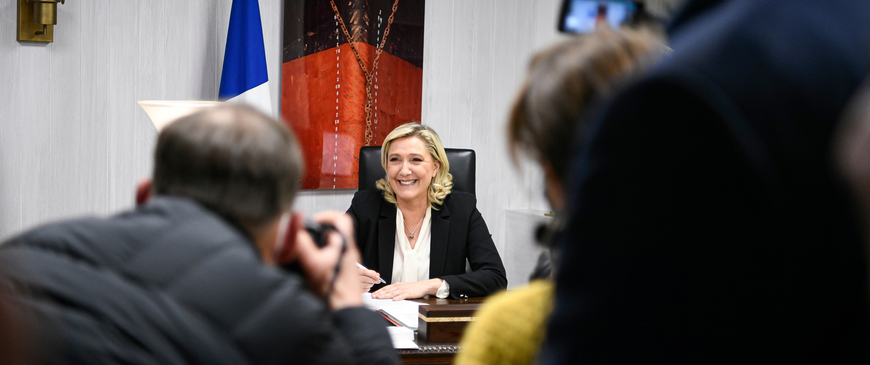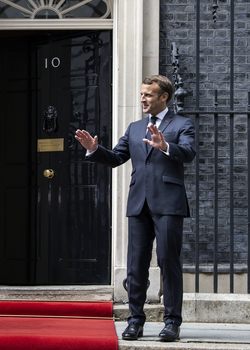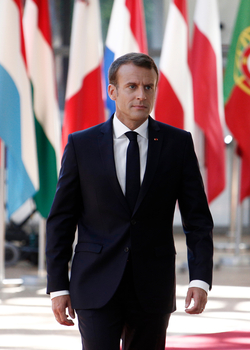
What would President Le Pen mean for Europe? A manifesto for trouble
Marine Le Pen has dropped her referendum on the euro, but her ‘France first’ agenda would cripple the EU from the inside and weaken the transatlantic alliance.
For months, Europe complacently assumed that Emmanuel Macron would win France’s April 2022 presidential election, with Marine Le Pen, leader of the right-wing populist Rassemblement National, making it to the second round on April 24th but without threatening Macron. The result of the first round of voting on April 10th, however, shows that the race between the two has tightened considerably – to the point where Le Pen has a realistic chance of winning. Were she to do so, the impact on the EU, NATO and European security would be profoundly destabilising.
Marine Le Pen has a realistic chance of winning the French presidency. The impact of that on the EU, NATO and European security would be profoundly destabilising.
In the 2017 election, Le Pen’s promise to hold a referendum on France’s euro membership was ill-timed. It came two years after a Greek referendum led to another recession there. And the eurozone was beginning a two-year boomlet that undercut her message that the French could only prosper without the euro. She made it to the second round of the presidential election, but was easily beaten by Macron. Five years later, Le Pen is no longer promising a euro referendum, but her euroscepticism endures. Her new strategy follows the tactics of the Polish and Hungarian governments: refuse to apply EU laws that she dislikes, especially those that prevent her from favouring French citizens over those of other member-states. The difference is that France (unlike Poland, Hungary or indeed the UK) is indispensable to the EU.
In her manifesto, ‘My plan for the presidency’, Le Pen writes little about the EU, apart from some barbs at the Commission and the European Court of Justice (ECJ). She makes a commitment to a “European Alliance of Nations which is intended to gradually replace the European Union”, but she does not seem sure she will succeed or who will be in it. She writes that the contacts she has made in other member-states, “including several heads of government, give me hope that this project will succeed in the medium-term.”
In some policy areas, Le Pen seeks reforms at the European level. She promises to renegotiate the Schengen agreement, which provides for passport-free travel between 26 European countries, arguing that the absence of border controls is “not in the interest of states”. But she would accept unspecified “simplified procedures” for EU citizens. Her chances of a successful renegotiation are zero: other Schengen members do not want permanent border controls (although several, including France, have used the agreement’s safeguard mechanism to re-impose border controls during the past seven years).
Knowing that other member-states are unlikely to agree to reforms at the EU level, Le Pen plans to act unilaterally in ways that will violate EU laws. Like former British prime minister David Cameron, she wants to curb migrants’ access to France’s social security system, proposing that only families with at least one French parent should be eligible for family benefits. EU laws prevent EU citizens that are resident in another country from being discriminated against in this way. David Cameron managed to achieve a small victory in his renegotiation of Britain’s membership, with newly arrived EU citizens only gradually gaining access to certain benefits over four years. But Le Pen’s proposals go further – she would end access unilaterally, albeit after a referendum on limiting immigration.
There are several other policy areas where Le Pen would break EU law, rather than trying to change it. She wants to reduce France’s payments to the EU budget unilaterally. Posted workers from other member-states would no longer be allowed: she claims this causes “an abyss in the public finances” (posted workers pay taxes in their home state). She wants to give priority access to social and student housing to French citizens. Young couples, at least one of whom must be a French citizen, will be given zero-interest loans to help them buy a house – and the loan would not have to be repaid if they have three or more children. EU rules prevent governments from preferring their own nationals over other EU citizens, because their nationals have better access to housing and therefore jobs. Le Pen would also ignore EU public procurement and state aid rules. She wants to make central and local governments ‘buy French’, to ensure restaurateurs source 80 per cent of their food from French farmers, and provide more aid to farmers than the subsidies provided under the Common Agricultural Policy (the latter might break EU state aid rules, depending on how it is designed).
After immigration, the biggest clash might be over climate policy. She would expand nuclear and hydroelectric power, and end new solar and onshore and offshore wind farms. Wind farms that have already been built would be dismantled. Under EU rules, over 32 per cent of gross final energy consumption must come from renewables by 2030. Le Pen wants France’s emissions reduction strategy to be decided nationally, and on an annual basis, rather than through the EU’s system of 10-year energy and climate plans.
Inevitably, all these policies would provoke legal action by the European Commission if they were enacted. The Commission would take France to the European Court of Justice, which would then issue rulings against France, since it would be in violation of its treaty commitments not to discriminate against workers and companies from other EU countries, and to apply EU climate and energy laws.
If she won it, Le Pen’s referendum on immigration would also change the French constitution. In her manifesto, she says that “immigration to France is mostly determined by the European Convention on Human Rights and by the jurisprudence of France’s Constitutional Council, its Council of State [supreme court], the European Court of Justice and the European Court of Human Rights”, with European law taking precedence over national law. Le Pen wants the power to be able to prevent EU citizens from exercising free movement rights, and to stop migrants from outside Europe from using the jurisprudence of the European Court of Human Rights to avoid deportation. So her referendum would amend the Constitution “to enforce national law over international law”.
There are doubts whether such a referendum would be legal under the French constitution. And if Rassemblement National failed to win a majority in the parliamentary elections that are due in June, the referendum, as well as the more radical parts of her agenda, would be unlikely to happen. But if the referendum went ahead and she won it, European law “would no longer be applied” if the government decided it was contrary to the “sovereign will” of France.
That would mean that Le Pen would, according to French law at least, be within her rights to ignore EU free movement laws, but also those on public procurement, state aid, climate, and any other area of policy that she chose. France would go further than Poland and Hungary, which have refused to apply ECJ rulings, and simply refuse to apply EU laws that do not suit it. Poland has also refused to pay EU fines for non-compliance.
If Le Pen enacted her policies, the consequences for the EU would be political chaos.
If Le Pen enacted her policies, the consequences for the EU would be political chaos. France would not leave the EU and the euro in the short term, which would – with luck – mean that financial markets would not take fright. But the EU institutions and the member-states have weak powers to force her to back down: fines imposed by the ECJ could simply be ignored, and France has enough fiscal capacity to accept the freezing of EU budget and recovery fund money under the new conditionality mechanism, which punishes countries that violate the rule of law. The EU would face gridlock on a whole range of policy issues: without the ‘tandem’ of Germany and France negotiating compromises between themselves on the big policy areas, little new legislation would be passed. But the biggest problem would be that the EU might have little ability to enforce its own laws in an indispensable member-state, while nationalist governments in the EU would have much greater critical mass, and act together to undermine the EU further.
President Le Pen would pose a threat not only to Europe’s internal order, but also to its external security. Her manifesto has relatively little to say about defence and foreign policy: Russia is referred to once, indirectly (the war in Ukraine has shown that “the policy of fait accompli has gradually become the norm” in international relations). China is mentioned as the country from which COVID-19 came; the US is the only country directly criticised, for deploying its law extra-territorially. But her concrete foreign and security policy proposals would be a significant departure from the post-Cold War French approach. They are founded on folie de grandeur: having described France as the world’s second largest power by geographical extent (based on the extent of its maritime zone around French Polynesia and other Indian Ocean and Pacific territories) she calls for a policy of “free hands” – that is to say, not being tied down by alliances. That is a policy prescription for a super-power, not a medium-sized European power that has decided to undermine its partnerships in the EU as well as NATO. Even the post-Brexit UK has tried to compensate for lost influence in the EU by increasing its political and military investment in NATO and in its bilateral relationship with the US.
Le Pen’s foreign and security policy proposals would be a significant departure from the post-Cold War French approach. They are founded on folie de grandeur.
By contrast, in order to give France back its freedom of action, Le Pen wants to withdraw from NATO’s integrated military structure, which France rejoined in 2009 after a 43-year absence. Such a step would deprive France of influence (one of the two Supreme Allied Commander posts is always held by a senior French officer, with the other going to an American) and complicate NATO planning. As in the Cold War, no doubt France and its allies would find ways to navigate the problems, but at the cost of time, additional bureaucracy and less effective decision-making.
Le Pen also calls for an end to defence industrial co-operation with Germany, which she describes as being conducted “to the detriment of our technological sovereignty and our industrial interests”. That would entail the collapse of several important joint projects including the Future Combat Air System – a collaborative project between Airbus and Dassault, with Spanish participation, to produce a successor to French Rafale, German Eurofighter and Spanish EF-18 aircraft. The overall result of French withdrawal from FCAS would probably be fewer aircraft procured, a loss of inter-operability (making co-operation between national forces harder) and a loss of European defence industrial capability. Similar considerations apply to the Franco-German programme to develop a new battle tank. Withdrawal would also give France less influence over Germany’s plans to re-arm in the light of Russia’s attack on Ukraine.
By contrast, Le Pen wants to reinforce co-operation with the UK, building on the Lancaster House treaties of 2010, which covered defence co-operation, including in the nuclear area. She has three priorities in particular: the fight against Islamic terrorism, cybersecurity and space. Given the UK’s strong attachment to NATO and to its relationship with the US, however, reaching agreement between London and Paris would probably be harder than it was in 2010, when France had just rejoined NATO’s integrated command structure.
Though she wants to increase France’s defence budget from €41 billion this year to €55 billion in 2027, Le Pen does not specify what military threats France faces, and barely mentions Russia. This perhaps reflects the ambiguity of her relationship with Vladimir Putin. In September 2014 (after the annexation of Crimea, the Russian invasion of the Donbas and the shooting down by Russian proxies of Malaysian Airlines flight MH17, with the loss of 298 lives) Le Pen's Front National, predecessor to the Rassemblement National, took a €9.4 million loan from a Russian bank suspected of ties to the Russian authorities. Putin held a meeting with Le Pen in the Kremlin during her 2017 election campaign; he described her as representing “a range of political forces that are gaining momentum”. Le Pen and her party colleagues in the European Parliament have consistently opposed sanctions on Russia. During this year’s campaign, even though she has criticised the invasion of Ukraine, she has also said that Putin could become an ally of France again if the war ended – a position at odds with that of US President Joe Biden and other Western leaders who have accused Putin of responsibility for war crimes. If Le Pen were elected, there is a risk that she would veto sanctions or only apply them weakly, and France’s relations with most of its allies and partners would be shaken.
French voters, like those in other countries, are unlikely to make their choice based on policy towards the EU or NATO. They will not care much about Le Pen’s promises to ensure French sovereignty over various uninhabited Pacific atolls (which her manifesto name-checks). The risk to Macron is that his perceived haughtiness, combined with rising prices and falling living standards, prompt voters to turn against him, with Le Pen the most likely beneficiary. Europe, threatened from the East by Putin, may find itself convulsed from the West by his admirer, Le Pen. Other Western leaders can only hope that French voters find alternative ways to express their discontent, and re-elect Macron.
Ian Bond is director of foreign policy and John Springford is deputy director of the Centre for European Reform.




Add new comment